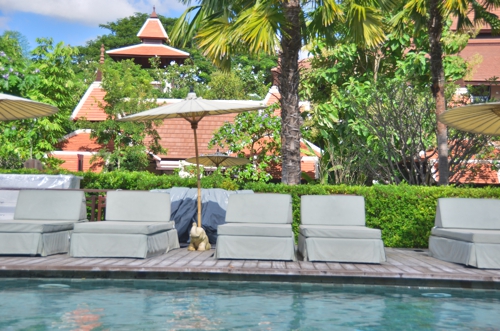 Recently, I decided to travel with my boyfriend Henrique to the island of Koh Samet. Less foreigner-infested than sex tourism hotspot Pattaya, but approximately the same distance from Bangkok, Koh Samet provides a more “real” Thailand travel experience.
Recently, I decided to travel with my boyfriend Henrique to the island of Koh Samet. Less foreigner-infested than sex tourism hotspot Pattaya, but approximately the same distance from Bangkok, Koh Samet provides a more “real” Thailand travel experience.
Unfortunately, we succumbed to one the less-savory aspects of real Thailand travel: We got scammed. The driver of our bus abandoned us at a gas station in the middle of nowhere and, when we refused to pay the exorbitant rate the conveniently-placed taxi driver quoted us, found ourselves quickly stranded in a place where nobody spoke English.
We ended up missing the boat to Samet but, thanks to a drunk farmer with just enough space for two farang in the back of his equipment-filled pickup, we caught the last bus back to Bangkok.
“This,” Henrique pouted to me, once we were on our way, “is why I prefer luxury travel.”
I rolled my eyes. ‘Luxury travel’? I thought to myself, not wanting to further upset my shellshocked boyfriend. That’s an oxymoron if I ever heard one.
The concept of luxury travel, from the shores of the Dead Sea in Jordan, to the deep reaches of the Amazon rainforest, to the heart of charming Chiang Mai, Thailand, where I visited just last week, is always the same: To afford high-end guests exotic, local experiences without sacrificing even an ounce of comfort.
The inherent fallacy? People native to the countries and regions most luxury travelers consider “exotic” don’t live comfortably. Many experience abject poverty, even if they are too ignorant of their position on the global food chain to feel devastated by it.
Jamaica Kincaid’s A Small Place, a long-form essay that specifically calls into question the tourism industry in Kincaid’s native Antigua, sums up the paradox of luxury travel poignantly: “Visiting heaps of death and ruin and feeling alive and inspired at the sight of it.”
I do realize, before you go calling me a hypocrite, that I am rich by global standards. (If you are reading this from any place other than a public Internet café, you should realize that you are probably rich, too.)
But to be fair, I have taken advantage of only a small number of the luxury travel opportunities that have come my way as a result of my increasing clout in the travel blogging community. And each has strengthened my convictions: Luxury travel isn’t really travel.
Observing widlife from the interior of an air-conditioned VIP van? Not travel. Planting rice at a private paddy behind your resort with the assistance of a team of professional rice growers? Not travel. Transporting yourself from point A to point B and never interacting with a single member of the local population? Not travel.
Look, I didn’t like sprinting across a poorly-lit highway after sunset last Saturday night so that I might hitchhike in the right direction after having been scammed. I didn’t want to get caught in a tropical downpour while hiking in Colombia’s Tayrona National Park this past May, or wade through a waist-deep river of mud to reach the exit three hours later.
I didn’t enjoy getting held at the Israeli border for five hours in 2010, and interrogated as if I were a terrorist because I had a stamp from Lebanon in my passport. And I certainly didn’t feel safe under the care of a doctor at a hospital in Vientiane, Laos, particularly not when she attempted to draw my blood with an unwrapped needle to ascertain the cause of my travel illness.
Yet each of these experiences, and the countless others I’ve had traveling the world independently the past several years, has imbued me with an appreciation and a respect for what the people who live in the countries I visit deal with on a daily basis.
I don’t have anything against rich people, or the fact that some expect more exclusive treatment because of their money. I would like to be richer myself!
But if you are unable to detach yourself from your wealth, your comfort and your entitlement for even a few days, then please just stay at home.

Robert Schrader is a travel writer and photographer who’s been roaming the world independently since 2005, writing for publications such as “CNNGo” and “Shanghaiist” along the way. His blog, Leave Your Daily Hell, provides a mix of travel advice, destination guides and personal essays covering the more esoteric aspects of life as a traveler.








